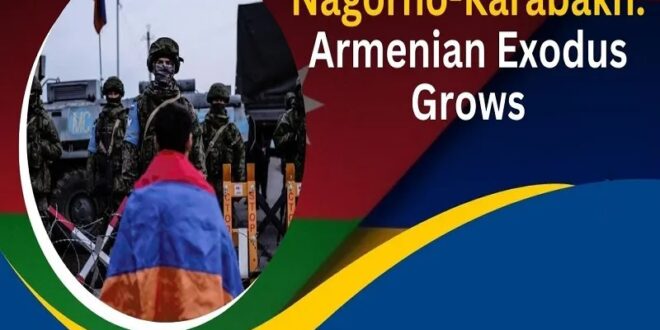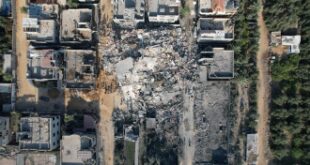The large-scale outflow of Armenian Christians from Karabakh, which is due to the diaspora manipulating emotionally vulnerable people into leaving Azerbaijan by scaremongering about their safety, could soon shake up domestic Armenian politics. The anti-Russian pro-Western faction is expected to lead a Color Revolution at the behest of their patrons, while the Russian-friendly ones who were misled into moving could ruin these plans if they lead a truly patriotic and multipolar revolution instead.
AFP reported that nearly half of Karabakh’s Armenian Christian population has left Azerbaijan in the aftermath of their unrecognized separatist entity’s capitulation to Baku in mid-September. Of crucial significance is that “Some of the families at the border told AFP that they were urged to leave by the separatists”, which extends credence to suspicions that this is an artificially manufactured process. The present analysis will elaborate on the political reasons that are behind this faux “ethnic cleansing”.
This piece here about how “False Claims Of ‘Genocide’ In Karabakh Are The West’s Latest Anti-Russian Dog Whistle” touches upon the dimension most relevant to Moscow, but the party that’ll most immediately be affected by all this is Armenia itself. The ultra-nationalist American- and French-based Armenian diaspora lobbies are obsessed with revanchism, which is why they’re now plotting to take revenge against Prime Minister Nikol Pashinyan after he failed to preserve their geopolitical project.
These influence groups are Russophobic to the core and hope to discredit the Kremlin throughout the course of this artificially manufactured “ethnic cleansing”, but their primary goal right now is to either overthrow Pashinyan through a Color Revolution or regain their gradually declining influence over him. In either case, the objective being pursued is to turn Armenia into an informal NATO bastion in the South Caucasus for dividing-and-ruling the region, to which end they want it to defect from the CSTO.
The Russian Foreign Ministry published a detailed statement on Monday that can be read here where they shared their country’s side of the story after Pashinyan maliciously smeared them as responsible for the collapse of Armenia’s puppet state in Azerbaijan. They debunked his false narrative blaming Moscow for the past three year’s developments that led to this outcome and also warned about the pernicious influence of these same diaspora lobbying groups.
Furthermore, the Foreign Ministry also defended the reputation of Russian peacekeepers in Karabakh in the face of groundless claims that they’re not properly protecting the region’s estimated 120,000 Armenian Christians. Their version of events was just substantiated on Thursday by the self-proclaimed separatist “authorities” who released a statement on that day declaring the dissolution of their unrecognized entity at the start of next year.
Of relevance to this piece, they confirmed that Russian peacekeepers reached an agreement with Azerbaijan for the “free, voluntary and unimpeded passage of residents of Nagorno-Karabakh, including military personnel who have laid down their arms”, to travel to Armenia via the Lachin Corridor. They’re allowed to take their property with them on their vehicles too. The statement also said they “should familiarize themselves with the conditions of reintegration presented by the Republic of Azerbaijan”.
What’s so curious about this is that it’s a repudiation of what some of those families told the AFP regarding how they were reportedly urged by the separatists to leave since these same separatists’ “authorities” officially stressed the “independent and individual decision” of all residents in this respect. It therefore appears that these forces themselves are split between those loyal to the anti-Russian diaspora lobby and the ones who remain grateful for everything Russia has done to protect them.
The large-scale outflow of Armenian Christians from Karabakh, which is due to the diaspora manipulating emotionally vulnerable people into leaving Azerbaijan by scaremongering about their safety, could soon shake up domestic Armenian politics. The anti-Russian pro-Western faction is expected to lead a Color Revolution at the behest of their patrons, while the Russian-friendly ones who were misled into moving could ruin these plans if they lead a truly patriotic and multipolar revolution instead.
The diaspora puppeteers assumed that all of Karabakh’s Armenian Christians who they’re corralling like cattle into Armenia will be loyal to their anti-Russian pro-Western cause, which is why the discovery of a Russian-friendly, patriotic, and multipolar faction comes as a surprise to them. These two groups, at both the leadership and civil society levels, command immense respect among Armenians simply by being from Azerbaijan and can therefore exert major influence over that country’s political dynamics.
Pashinyan is now placed in a difficult predicament since he might soon have to face two separate protest movements, each of which has their own sympathizers within his state and society. Had it not been for the influence that the Russian-friendly, patriotic, and multipolar faction commands among his people, then it could have been taken for granted that the anti-Russian pro-US diaspora-backed one would topple him. Now, however, it’s much less clear what might happen.
That aforesaid scenario could of course still unfold, but so too might the one of a truly patriotic and multipolar revolution, with each’s prospects spiking if their respective state supporters from the military and/or intelligence structures join in their efforts to carry out a coup of some sort. Another possibility is that he bends to the will of one of them and then brutally cracks down against the other, but that could also provoke their aforesaid military-intelligence supporters into revolting, which is why it’s risky.
The best-case scenario would be for him to call free and fair elections as early as possible in order to let the Armenian people themselves democratically decide the future of their country. Should that happen, then the potentially forthcoming unrest could possibly be averted, at least in the interim. If successful, then Armenia’s seemingly impending slide into anarchy could be delayed until after the next elections, when the diaspora’s puppets might provoke anti-state violence if their candidate doesn’t win.
Whatever ends up happening, observers shouldn’t lose sight of the fact that the artificially manufactured “ethnic cleansing” of Karabakh is a political ploy designed by the diaspora to give them an on-the-ground edge in their planned anti-Russian pro-Western Color Revolution against Pashinyan. What they didn’t realize is that this influential demographic that they’re practically exporting from Azerbaijan into Armenia also consists of a Russian-friendly, patriotic, and multipolar faction.
This variable complicates their regime change plot and could ultimately lead to it failing if the second-mentioned group is able to convince their co-ethnics of the need to pragmatically reintegrate Armenia into the region after the war instead of turning it into an informal NATO bastion. Their vision of the future will stabilize the region and result in prosperity for all, while the diaspora’s will destabilize the region and only worsen Armenians’ already abject poverty.
Any anti-constitutional change of government in either direction risks radicalizing both factions and accordingly raising the possibility of violence to the detriment of everyone, which is why it should be avoided. Nevertheless, some unrest might be inevitable since tensions between these two are running high. The introduction of the influential Karabakh element into this explosive situation makes everything all the more unpredictable so it’s anyone’s guess what’ll happen next.
 Eurasia Press & News
Eurasia Press & News




